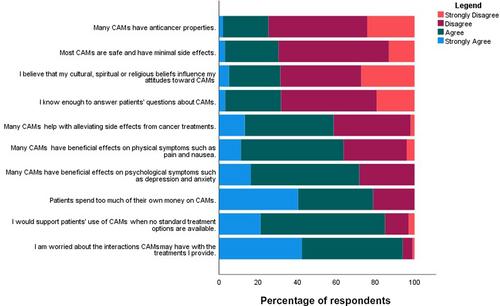Approximately half of people with cancer are using complementary and alternative medicine (CAM), presenting safety concerns due to potential interactions with conventional cancer treatment. Oncology staff have a role to play in ensuring the safe use of CAMs and so, this study examined their knowledge, attitudes, and practices regarding CAMs.
This study aimed to assess the knowledge, attitudes, and practices of Australian doctors, nurses, and pharmacists regarding CAM use in oncology.
Members of three national oncology professional associations took part in an online questionnaire, which determined their knowledge, attitudes, and practices regarding CAM.
Ninety-nine completed surveys were obtained from nine doctors, 70 nurses, and 20 pharmacists. Most respondents (68.4%) felt that they did not have adequate knowledge of CAMs to respond to patients' questions. Assessment of attitudes found respondents generally believed that CAMs have a complementary role in oncology but indicated their concerns for the safety of patients. Respondents indicated in practice they would discuss CAMs with less than half of patients (40.6%), with a lack of scientific data and guidelines for CAM use presenting significant barriers to these discussions.
Our study suggests that oncology health professionals' knowledge of CAMs potentially leads to a lack of confidence in providing advice to patients and concerns for patient safety. This impacts their discussion of CAMs and lack of disclosure from patients about their use of CAMs. Education on CAMs in oncology would assist in increasing professionals' confidence in discussing these therapies, leading to increased patient disclosure of CAMs and safer treatment decision making for people with cancer.



